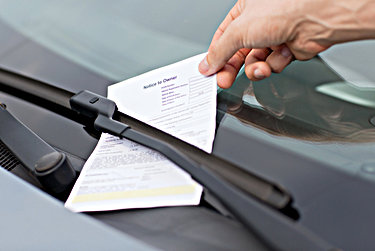How a Moving Violation Affects Your Insurance Premiums

By Nick DiUlio
No one likes getting a ticket, but the pain of the penalty sometimes pales in comparison to the long-lasting impact it can have on your insurance premium.
A recent Quadrant Information Services study found car insurance premiums can climb by as much as 94 percent on average after a single moving violation. The study analyzed the average national premium increase for one moving violation in several categories, such as driving under the influence and speeding.
For instance, one conviction for driving under the influence (DUI) — also known as driving while intoxicated or DWI — will result in a national average premium increase of 94 percent (up from 92 percent in 2015). However, failing to signal only results in a national average premium spike of 19 percent.
RELATED: These States Have the Highest Traffic Fines
“Insurers base their rates on experience, so the violations that cause premiums to jump the most are the ones that, over the years, insurers have found are strong indicators that the driver is likely to have an accident in the future,” says Mike Barry, spokesman for the nonprofit Insurance Information Institute (III). “Seen that way, this study makes a lot of sense.”
Here’s a closer look at the findings.
Premium increases by moving violation
Here are the national average premium increases for the 10 most expensive violations:
- DUI/DWI: 94 percent
- Reckless driving: 85 percent
- Speeding by 31 mph or more: 29 percent
- Speeding by 16 to 30 mph: 28 percent
- Careless driving: 27 percent
- Driving the wrong way: 21 percent
- Speeding by 1 to 15 mph: 21 percent
- Improper passing: 21 percent
- Following too close: 19 percent
- Failure to stop: 19 percent
“The bottom line is that the riskier a driver is, the more expensive he or she is to insure,” says Eli Lehrer, president of the nonprofit research group the R Street Institute. “And in general, the moving violations that result in larger premium increases correlate more closely with future claims behavior.”
Moving violation penalties vary by state
In addition to the type of moving violation you incur, the average premium increase for a single ticket will vary depending on the state where you live. Here are some examples of how premium spikes are affected by state and violation:
— A first-time DUI conviction in North Carolina will result in an average premium increase of 334 percent. In Hawaii it’s 294 percent, 189 percent in California and 128 percent in New Jersey. Meanwhile, the same violation in Maryland will only result in an average premium increase of 15 percent.
— A reckless driving violation in Hawaii will result in an average premium increase of 291 percent. It’s 189 percent in California, 116 percent in Michigan and 110 percent in Illinois. In Louisiana the same violation will only cause an average premium increase of 29 percent.
— Illinois drivers caught speeding more than 30 miles per hour over the posted limit will see an average premium increase of 99 percent for a single violation. Meanwhile, the same violation in Missouri will only result in an average premium increase of 9 percent.
According to Dan Weedin, a Seattle-based insurance and risk management consultant, these notable disparities are based on the way each state regulates auto insurance companies and the factors they can use to increase premiums.
“It’s all up to how individual state insurance commissioners allow each company to assess rates,” Weedin says.
How to keep premiums low after a moving violation
No moving violation stays on your driving record forever. Most first-time infractions will impact your premium for between three and five years, but the details will depend on your state. Follow these tips to potentially ease an increased premium.
1. Seek forgiveness. Auto insurers will typically be somewhat forgiving of minor moving violations like failure to stop or failure to signal. They may offer first-time moving violation forgiveness and not increase your premium. Additionally, many states offer driving classes to help individuals remove one or two moving violations from their records.
2. Make a deal. According to Lehrer, most states offer plea bargains at traffic court that can help drivers expunge points from their record and therefore avoid an increase in annual premium, provided the violation isn’t too severe.
3. Shop around. Shopping for a new car insurance policy after receiving a moving violation may also be a good idea, but you won’t be able to hide your record.
According to Barry, all insurers are different, so there’s a chance you could find a new policy that’s cheaper than the one you have, even if you’ve got a moving violation. Or you might simply have to wait it out for three to five years before your premium falls to pre-violation levels.
Want to learn more about lowering your auto insurance rates? Let NetQuote help you find the best insurance provider at the lowest rate.
